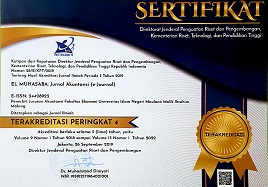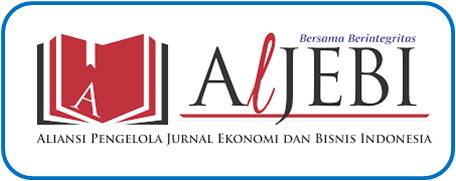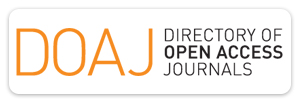Studi Fenomenologi: Audit Investigasi dalam Pengungkapan Fraud
Abstract
Method: This study involves six auditors from 3 KAPs in Malang City. Research data was obtained through semi-structured interviews. Interview data was analyzed by taking the essence of noema and noesis to get meaning.
Results: Not all auditors use the latest investigative audit standards when conducting investigative audits. Understanding investigative audit standards, accounting, and legal is needed to support competence, apart from experience and certification. The complexity of audit procedures in analyzing data is an obstacle auditors face. In addition, the threat of intimidation felt by auditors can disrupt the audit process. The availability of data and collaboration with related parties supports the success of an investigative audit.
Implications: Auditors must participate in continuous professional training in investigative audits to improve their competence. Apart from that, cooperation between various parties is needed to provide auditors with audit data and a sense of security.
Novelty: This research contributes to the investigative audit literature using a qualitative phenomenological approach, which is still rarely found. The phenomenological approach provides an in-depth understanding of investigative audits from the perspective of its auditors.
Keywords
Full Text:
PDFReferences
Abd. Hadi, Asrori, & Rusman. (2015). Penelitian Kualitatif Studi Fenomenologi, Case Study, Grounded Theory, Etnografi, Biografi. In Paper Knowledge . Toward a Media History of Documents (Vol. 3, Issue April).
Anggraini, W. R., & Suryani, A. W. (2021). Fraudulent financial reporting through the lens of the fraud pentagon theory. Jurnal Akuntansi Aktual, 8, 1–12.
Antikorupsi. (2021). Tren Penindakan Kasus Korupsi Semester 1 Tahun 2021. Antikorupsi.Org. https://antikorupsi.org/id/article/tren-penindakan-kasus-korupsi-semester-1-tahun-2021
Asih, I. D. (2005). Fenomenologi Husserl: Sebuah Cara Kembali ke Fenomena. Jurnal Keperawatan Indonesia, 9(2), 75–80.
Aviantara, R. (2021). The Association Between Fraud Hexagon and Government’s Fraudulent Financial Report. Asia Pacific Fraud Journal, 6(1), 26. https://doi.org/10.21532/apfjournal.v6i1.192
Boeree, C. G. (1998). Qualitative Methods: Part One. http://webspace.ship.edu/cgboer/qualmethone.html
Craja, P., Kim, A., & Lessmann, S. (2020). Deep learning for detecting financial statement fraud. Decision Support Systems, 139(September), 113421. https://doi.org/10.1016/j.dss.2020.113421
Creswell, J. W. (2013). Qualitative Inquiry & Research Design. In Sage (3rd ed.). SAGE Publications, Inc.
Dari, P. W., Nor, W., & Rasidah, R. (2021). Determinan kemampuan pemeriksa dalam mendeteksi fraud. Jurnal Akuntansi Aktual, 8(2), 85–96. https://doi.org/10.17977/um004v8i22021p085
Denzin, N. K., & Lincoln, Y. S. (2018). Qualitative Research. In SAGE (fifth). SAGE Publications, Inc.
Djamhuri, A. (2011). Ilmu Pengetahuan Sosial dan Berbagai Paradigma dalam Kajian Akuntansi. Jurnal Akuntansi Multiparadigma, 15(4), 1–26. https://doi.org/10.18202/jamal.2011.04.7115
Hafizhah, N., & Abdurahim, A. (2017). Pengaruh Tekanan Waktu, Independensi, Skeptisme Profesional, dan Pengalaman Kerja Terhadap Kemampuan Auditor Mendeteksi Kecurangan Pada Laporan Keuangan (Studi pada Empiris Badan Pemeriksa Keuangan Perwakilan Provinsi Daerah Istimewa Yogyakarta). Reviu Akuntansi Dan Bisnis Indonesia, 1(1), 68–77. https://doi.org/10.18196/rab.010107
Hanifah, I. A., & Clyde, V. (2022). The Effect of Whistlebowing System toward Fraud Prevention: Medition of Forensic and Investigative Audit. AFRE (Accounting and Financial Review), 5(2), 97–105. https://www.jurnal.unmer.ac.id/index.php/afr/article/view/7530
Hirsch, K. E. (2015). Phenomenology and educational research. Education Papers and Journal Articles 2015, 3, 251–260.
Kamil, I. (2021). Kasus Jiwasraya, 13 Korporasi Didakwa Rugikan Negara Rp 10 Triliun. Kompas.Com. https://nasional.kompas.com/read/2021/05/31/17464811/kasus-jiwasraya-13-korporasi-didakwa-rugikan-negara-rp-10-triliun
King, M. (2020). Financial fraud investigative interviewing – corporate investigators’ beliefs and practices: a qualitative inquiry. Journal of Financial Crime, 28(2), 345–358. https://doi.org/10.1108/JFC-08-2020-0158
Lameng, Agung K. Y. A., & Dwiranda, Anak A. N. B., (2018). Pengaruh Kemampuan, Pengalaman, dan Independensi Auditor Pada Efektivitas Pelaksanaan Prosedur Audit Investigatif. E-Jurnal Akuntansi Universitas Udayana, 22(1): 187-215. https://doi.org/10.24843/EJA.2018.v22.i01.p08
Larasati, D., Andreas, A., & Rofika, R. (2020). Teknik Audit Investigatif, Pengalaman, dan Profesionalisme Auditor pada Pengungkapan Kecurangan: Kecerdasan Spiritual Sebagai Pemoderasi. Https://Current.Ejournal.Unri.Ac.Idcurrent.Ejournal.Unri.Ac.Id, 1(1), 149–168.
Malang Corruption Watch. (2021). Laporan Akhir Tahun MCW 2021. Malang Corruption Watch. https://mcw-malang.org/laporan-akhir-tahun-mcw-2021/
Mamahit, A. I., & Urumsah, D. (2018). The Comprehensive Model of Whistle-Blowing, Forensic Audit, Audit Investigation, and Fraud Detection. Journal of Accounting and Strategic Finance Vol.1 No.02 November 2018, Pp. 153-162 ISSN, 1(02), 153–162. https://journal.epistemikpress.id/index.php/Epistemik/article/view/43
Mulyadi, R., & Nawawi, M. (2020). Pengaruh Audit Forensik , Audit Investigasi , Profesionalisme terhadap Pencegahan Kecurangan ( Studi Empiris pada BPKP Provinsi Banten ). JURNAL RISET AKUNTANSI TERPADU, 13(2), 272–295.
Navarrete, A. C., & Gallego, A. C. (2022). Forensic accounting tools for fraud deterrence: a qualitative approach. Journal of Financial Crime. https://doi.org/10.1108/JFC-03-2022-0068
Neubauer, B. E., Witkop, C. T., & Varpio, L. (2019). How phenomenology can help us learn from the experiences of others. Perspect Med Educ, 8, 90–97. https://doi.org/10.1007/s40037-019-0509-2
Oyerogba, E. O. (2021). Forensic auditing mechanism and fraud detection: the case of Nigerian public sector. Journal of Accounting in Emerging Economies, 11(5), 752–775. https://doi.org/10.1108/JAEE-04-2020-0072
Pelu, M. F. A., Muslim, & Nurfadilah. (2020). Pengaruh Kompetensi, Skeptisme Profesional Auditor Dan Tekanan Anggaran Waktu Terhadap Pelaksanaan Audit Investigasi. Ekonomika, 4(1), 36–45.
Putri, A. E., & Arkananta, P. (2020). Kasus Garuda Indonesia, Riwayatmu Kini. https://imagama.feb.ugm.ac.id/kasus-garuda-indonesia-riwayatmu-kini/
Qodri, L., Gamayuni, R. R., & Sudrajat, S. (2019). Effect of Task Complexity, Role of Whistleblower and Investigative Auditor’s Ability on the Effectiveness of the Implementation of Audit Procedures in Proving Fraud. International Journal for Innovation Education and Research, 7(12), 756–761. https://doi.org/10.31686/ijier.vol7.iss12.2067
Raharjo, T. P., Djaddang, S., & Supriyadi, E. (2020). Peran Kode Etik Atas Pengaruh Akuntansi Forensik, Audit Investigatif dan Data Mining Terhadap Pendeteksian Dugaan Tindak Pidana Pencucian Uang. Jurnal Riset Akuntansi & Perpajakan (JRAP), 7(02), 219–234. https://doi.org/10.35838/jrap.v7i02.1677
Rahmawati, N. S., & Laksmi. (2022). Kajian Fenomenologi Pada Pengalaman Auditor Internal di Kementerian X Dalam Melaksanakan Audit. JIPI (Jurnal Ilmu Perpustakaan Dan Informasi), 7(1), 55. https://doi.org/10.30829/jipi.v7i1.9611
Rahmayani, L., Kamaliah, & Susilatri. (2014). Pengaruh Kemampuan Auditor, Skeptisme profesional Auditor, Teknik Audit dan Whistleblower Terhadap Efektivitas Pelaksanaan Audit Investigasi Dalam Pengungkapan Kecurangan. Jom Fekon, 1(2), 1–15.
Ramadhani, A. R., Triyuwono, I., & Purwanti, L. (2019). Mengungkap Cara Melakukan Praktik Fraud di Pemerintah Kota Malang. Riset Akuntansi Dan Keuangan Indonesia, 4(1), 53–66. https://doi.org/10.23917/reaksi.v4i1.7311
Sanders, P. (1982). of Way Phenomenology : The Academy of Management Reveiw, 7(3), 353–360.
Sinaga, Ekarista I., & Rahmah, Mulla. (2023). Pengaruh Akuntansi Forensik dan Audit Investigasi Terhadap Pengungkapan Fraud Pelopor Keuangan. Jurnal Akuntansi Bisnis Krisnadwipayana, 10(1).
Syahputra, B. E., & Urumsah, D. (2019). Deteksi Fraud Melalui Audit Pemerintahan yang Efektif: Analisis Multigrup Gender dan Pengalaman. Jurnal Akuntansi Dan Bisnis, 19(1), 31. https://doi.org/10.20961/jab.v19i1.319
Tjeng, P. S., & Nopianti, R. (2020). The Audit Investigation and Accounting Forensicin Detecting Fraud in Digital Environment. International Journal of Accounting and Taxation, 8(1), 44–54. https://doi.org/10.15640/ijat.v8n1a6
Tomkins, L., & Eatough, V. (2013). The feel of experience: Phenomenological ideas for organizational research. Qualitative Research in Organizations and Management: An International Journal, 8(3), 258–275. https://doi.org/10.1108/QROM-04-2012-1060
Transparency. (2021). CORRUPTION PERCEPTIONS INDEX. Transparency. https://www.transparency.org/en/cpi/2021
Tuanakotta, T. M. (2010). Akuntansi Forensik dan Audit Investigatif (Salemba 4 (ed.); 2nd ed.). Salemba Empat.
Vanasco, R. R. (1998). Fraud Auditing. Managerial Auditing Journal, 13(1), 4–71. https://doi.org/10.21512/tw.v3i2.3847
Wiharti, R. R., & Novita, N. (2020). Dampak Penerapan Akuntansi Forensik dan Audit Investigasi dalam Mendeteksi Fraud Pengadaan Barang/Jasa. Jurnal Ilmiah Akuntansi Dan Humanika, 10(2), 115. https://doi.org/10.23887/jiah.v10i2.24698
Wulandari, D. N., & Nuryanto, M. (2018). Pengaruh Pengendalian Internal, Kesadaran Anti-Fraud, Integritas, Independensi, dan Profesionalisme Terhadap Pencegahan Kecurangan. Jurnal Riset Akuntansi Mercu Buana, 4(2), 117. https://doi.org/10.26486/jramb.v4i2.557
Zhu, X., Ao, X., Qin, Z., Chang, Y., Liu, Y., He, Q., & Li, J. (2021). Intelligent financial fraud detection practices in post-pandemic era. The Innovation, 2(4), 100176. https://doi.org/10.1016/j.xinn.2021.100176
DOI: https://doi.org/10.18860/em.v15i2.24109
Refbacks
- There are currently no refbacks.
Editorial Office:
Megawati Soekarnoputri Building
Accounting Department, Faculty of Economics
Jln. Gajayana 50 Telp (0341) 558881
E-mail: elmuhasaba@uin-malang.ac.id
Universitas Islam Negeri Maulana Malik Ibrahim Malang
E-ISSN 2442-8922
P-ISSN 2086-1249

This work is licensed under a CC BY SA 4.0 International License

















